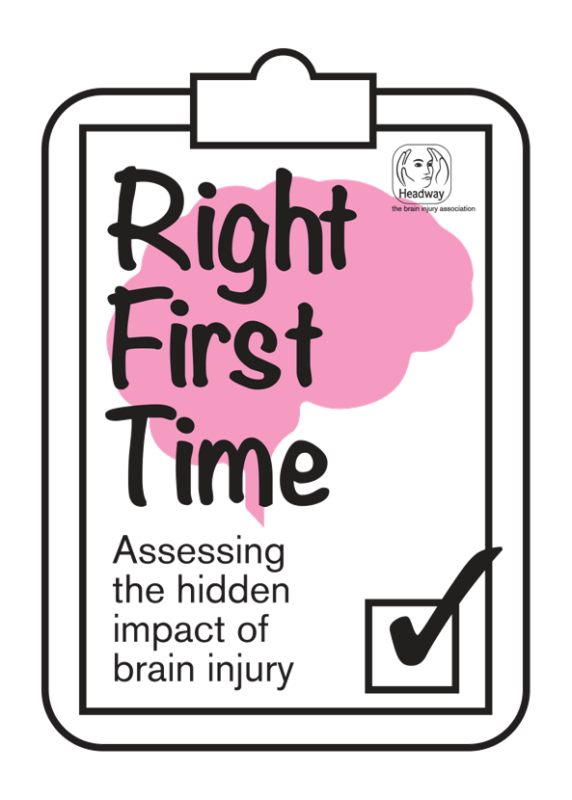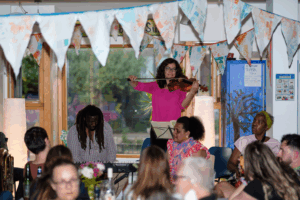Hi Natalie! Would you tell us a little bit about your job and what you do on a daily basis?
Of course! I’m a Senior Caseworker at Headway East London. The Casework department exists to provide advice, advocacy and support to anyone within our catchment area who has been affected by brain injury. For survivors, families and carers this includes appropriate signposting and navigation through the benefits system, support for people experiencing homelessness, difficulties with housing benefits, liaison through the care needs and assessment process, and if necessary, integration into our other free and funded services.
How does the ‘Right First Time’ campaign currently run by Headway relate to your work?
Well, problems with benefits may be the most common piece of advocacy work we carry out at Headway. It can happen at any moment in a person’s life, and we find it will often end up happening multiple times.
We’ve got an Early Intervention Project, supporting families of loved ones in the trauma wards at the Royal London Hospital, and the first thing they say is, “What about money?” It’s such an integral part of your life and having that steady stream of income suddenly cut is an added worry that shouldn’t be there whilst you’re loved one is fighting to survive.
Our experience of the both the ESA work capability and PIP medical assessments is that it is definitely not an easy process, and we very rarely see anyone getting the correct amount of points the first time. We’re then navigating though a very complex system, averaging around 9 months (from form filling, to assessments, to mandatory reconsiderations to tribunals) and that is incredibly stressful for both the brain injury survivor and the family or carers supporting them. The system is just too complicated, and the assessors have such little knowledge of brain injury that we have to do a huge amount of work gathering and submitting medical and insight reports to support cases.
Can you talk us through some of the difficulties you’re currently finding with the system?
Well I’d start by saying it’s not an isolated or small issue at all. 3.3 million people applied for ESA between 2013 and 2017, and of the 59,000 who were sent to the appeals stage, 61% had their decision overturned by the tribunal. From our own experience, Headway East London has a 100% record for overturned appeals at tribunal stage since the Casework team was established. So something isn’t working, there’s a breakdown in communication somewhere in the system. We’ve had tribunals overturned within two minutes, along with an apology from the judge, which is a nice acknowledgement but a little late for the people involved.
For many, the tribunal is the last step in a trauma that has been months in progress. There’s one gentleman I’ve worked with who had his injury seven or eight years ago, and he’s continuously had some PIP form in process for the last 20 months. By the time he wins his appeals process he receives a letter saying, “Your PIP is about to come to an end for the year”. He’s now been to three tribunals, three medical assessments and nothing’s changed.
Can you tell us a little more about the assessment process and the difficulties you’ve witnessed?
Personally, I think the whole process is extremely short-sighted. Even down to the way the assessments are carried out, often in cramped, busy offices where people are getting emotionally volatile and distressed. We’ve sometimes been waiting for a couple of hours before being told we won’t be seen that day; and that member has been planning and stressing about that meeting for weeks. It’s just a lack of awareness of these factors.
Whilst ESA and PIP both carry out cognitive and physical assessments, they aren’t comprehensive enough to deal with the complexities of brain injury. We have reports from neuropsychologists and OT, which have very detailed cognitive breakdowns but often the assessor’s official view is based on a tick box exercise. We’ve found that the ‘Decision Maker’ in the initial assessment does not need to have any medical background, which means they will lack the experience needed to decipher all of the detail and specifics within the reports we provide.
This also means they will miss the importance of insight (or lack of) for a person and how this can really change the meaning of an answer.
One of the other descriptors is about getting around; not so much physically but more on orientation and getting somewhere new. One person said, “My wife gets the address on Citymapper, draws a map, and goes with me the first five times but if there’s any change to the schedule, I’m lost”, and when they received their report back they had been assessed an “independent traveller”. A tick box takes out all of the challenges and complexities of a situation, and the roles of others involved in supporting the survivor.
Could you talk a little bit more about this emotional impact that you’ve seen for those involved?
It all comes back to the feeling of loss that many survivors have experienced since their injury. For so many of us, our work, skills or social networks measure our self-worth. After brain injury these are often affected, and it can take a long time to adjust and accept a new reality. Then to be threatened with further loss and upheaval – it’s incredibly distressing.
It is also suggesting to people that the slow progress they have made will now be held against them. People can get really paranoid about disclosing their achievements. They might think, “I really want to get back on my bike and physically I’m OK, it’s all the cognitive stuff, but what if I’m seen?” We had one man who ran half a marathon and he was so paranoid that all his benefits were going to be taken away. That’s no way to live. These things should be celebrated but instead they are held against people because there’s so little wider understanding.
You also support families and carers through this process when the survivor is unable to navigate the process alone – what impact do you see on them?
Well, living with a brain injury has a domino effect on the family. Everyone is affected, and this is definitely the case here too. They’re just trying to get what their loved one is entitled to, but often finding the process so stressful or confusing that they just give up. They get to a point of crisis and that’s when they come to us. It’s pushing families to the point where they can’t go on anymore; more than 60% of relationships break down after brain injury. Whack this process on top of it and I’m sure there’s more. For many, things build up and it gets too much.
The financial aspect of it is also incredibly stressful, particularly if the injured person was the breadwinner in the family. There’s a ticking clock to try and jump through hoops with no knowledge or experience as to how to do this.
A lot of carers go along to the assessments, and it can be a really harsh insight tool for families, because you’re going through all the nitty gritty. It’s exposing the vulnerabilities of a person in front of the people they want to reassure the most.
How do things currently look and what changes would you like to see?
Despite all the challenges we have been luckier than some. We’ve got a really good contact with IAS at the moment (IAS, previously ATOS, are an independent assessment service commissioned by DWP to complete all medical face to face assessment and work capability assessments). Our contact there has come to the Headway Day Service to speak with staff about our complaints and questions, and is always happy to review individual cases. They’ve also been along to some of our Family Support Groups so that families and survivors have a chance to share experiences and feedback, and hopefully enact some change. I’d say we’re having some success there, as now there is an acknowledgement that brain injury is very different to a lot of other disabilities and each injury is unique.
I know Headway UK are looking to establish a similar contact within the ESA process, and we are looking forward to seeing what impact the Right First Time campaign has to the overall experience of this process.
It’s great to see the issue being raised in parliament, and the more that we share the difficulties being faced by survivors, their families and the organisations supporting them, the closer I believe we’ll get to seeing some real change take place.
We’ve also just helped IAS to develop a condition insight report. The document will have an in-depth overview of many common changes experienced following a brain injury and how these can manifest into complex and challenging behaviours/symptoms. Every medical assessor conducting a work capability assessment (ESA) or medical face-to-face (PIP) will read this document before assessing someone with a brain injury. This will give them valuable insight before conducting the assessment. It also provides practical advice such as modifying speed of spoken word, ask questions clearly and allow time to respond due to information processing abilities. I was privileged to be asked to draft one in partnership with members, carers and senior staff at Headway and this will now be a national document.
It’s a small win but it’s progress, and right now that’s what we need.




